How I Made This: Jacob Whitchurch (CFA’26)

Jacob Whitchurch (CFA’26) is expanding his understanding of what it means to be an orchestral composer. Geese are involved.
Jacob Whitchurch (CFA’26)
On composition, compassion…and geese
How I Made This is a series from BU Today that explores how Boston University students create their works of art—be it a musical composition, a fiber sculpture, a short story, a painting, and beyond. Are you part of BU’s creative community? Tell us about your work here.
As he was finishing up his first year in the College of Fine Arts School of Music MFA composition program, Jacob Whitchurch was thinking hard about what kind of composer he wanted to be. A musician from an early age—trumpet is his weapon of choice—Whitchurch (CFA’26) has been contending with the notion that a composer must have a compassionate understanding of the strengths and needs of the people playing his music.
“It’s about writing a piece that [musicians] can be successful playing. I’ve played pieces where the composer obviously doesn’t have that in mind, and it’s not a good experience,” he says. “You spend the whole time wondering, why did they write this?”
Whitchurch is holding on to that perspective as he expands his compositional knowledge. In his orchestration class, he was tasked by Joshua Fineberg, a professor of composition and director of the School of Music’s Center for New Music and its Electronic Music Studio, to take an expansive approach to composition that emphasizes properties of an individual sound over traditional melodic frameworks. Fineberg tasked his students to take field recordings of the world around them and turn them into orchestral compositions—which inspired Whitchurch to take his project in an unexpected direction. It might sound like a complicated premise, but to him, it belies a fundamental truth about the composition process.
“A lot of the composers I’ve been learning about will go out in nature, and that’s how they find their muse,” he says. “I’m finding more and more that I’m wanting to get outside and actually experience things, because that’s the fuel that goes into the tank.”
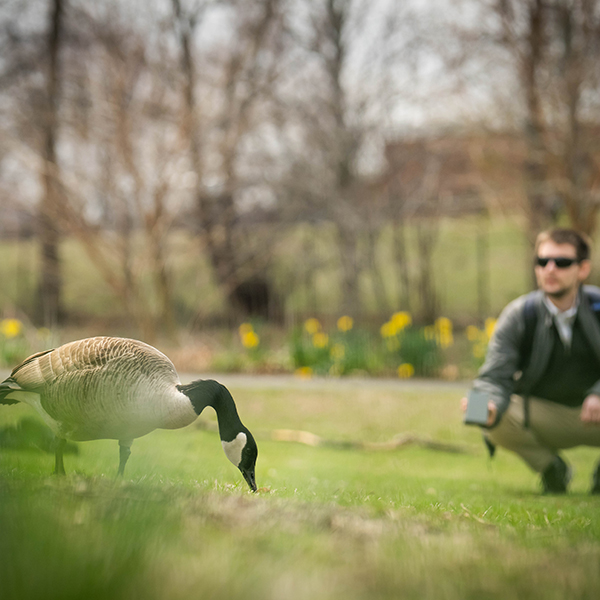
On his morning commutes to CFA, Whitchurch was amused to observe how Canada geese seem to delight in holding up traffic—“a funny moment of nature meeting the artificial world,” he says. He decided to make them the subject of a composition project for his orchestration class.
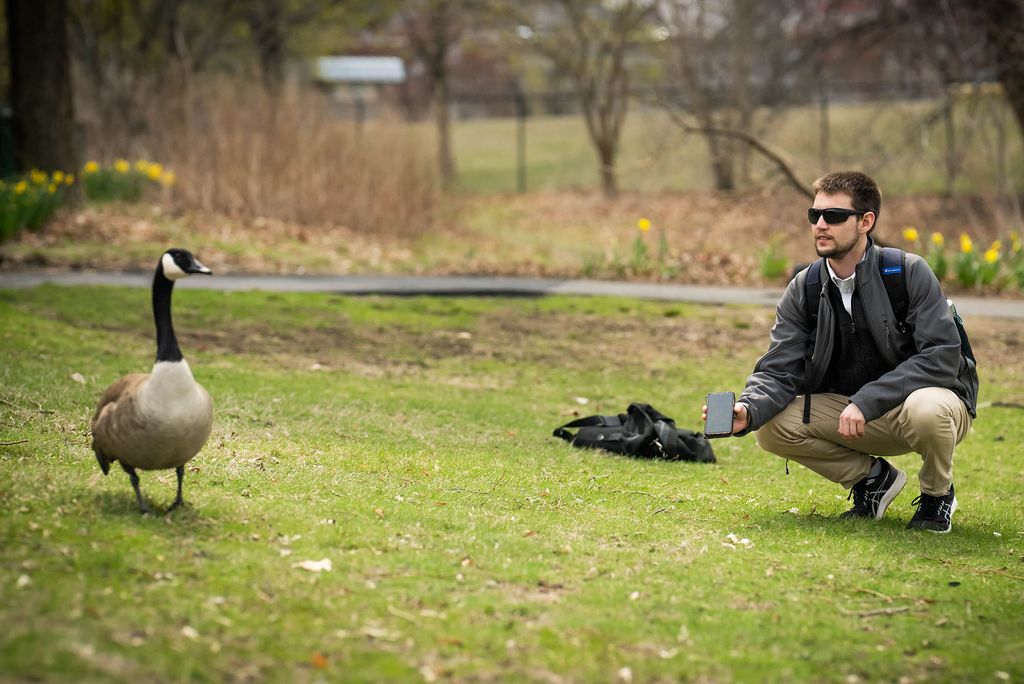
Not known as the friendliest of birds, Canada geese require a few feet of distance from someone intrepid enough to record them.
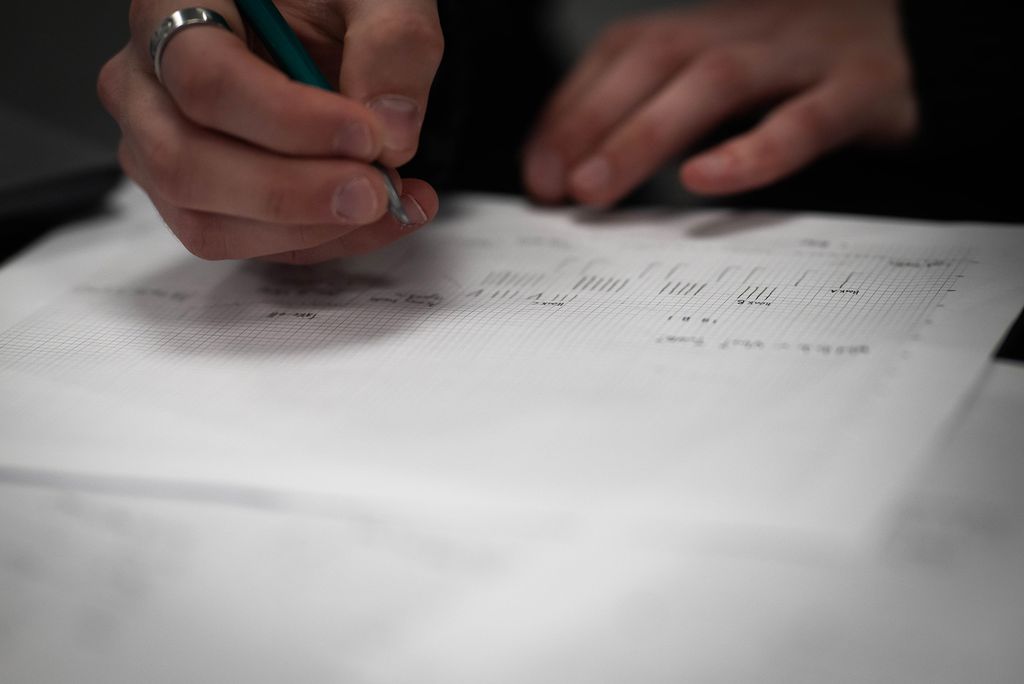
After taking his field recordings, Whitchurch plans out his compositions by hand to get a better understanding of how these natural sounds can be transposed into an orchestral composition. He also converts his recordings into audio spectrograms—visual representations of audio frequency over a given period of time—which helps him conceptualize the sonic information.
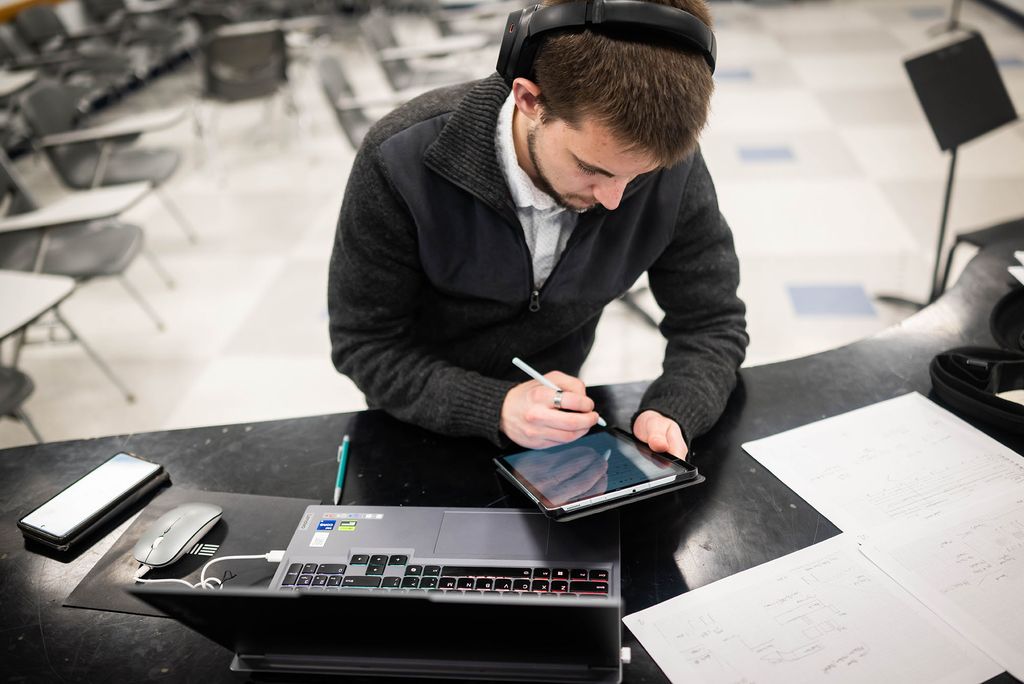
One of the final steps of Whitchurch’s composition process is moving his hand notations over to a digital notation software program.
“How I Made This”
BU Today: I’m going to take a wild guess that before you began composing music, you were a musician yourself.
Jacob Whitchurch: I started playing trumpet the summer before seventh grade. I picked it up fairly quickly, but I also had a really good teacher who saw that I was interested in music. Through high school I did marching band, jazz band, concert band, and all that fun stuff. Eventually, I got tangled up in the composition side a bit more. I discovered a free notation software, and I started playing around with the idea of having multiple people playing stuff together. And really, I had no idea what I was doing. I was given the metaphorical keys to a sports car and had no idea how to drive it.
BU Today: Who were some of your early composer inspirations?
Jacob Whitchurch: Growing up, I really enjoyed film and video game scores. Looking back, I realize a lot of my musical taste comes from that. I feel like they were able to condense musical ideas in a way that was very clear and immediate. I listen to a lot of [film composer] John Williams [Hon.’85]—his music doesn’t get old. Part of why I’m doing the master’s degree is to figure out what the next step is. So I’m just thinking, I like video game scoring, I like orchestral literature, I like ensemble stuff. Let’s try that out.
BU Today: Tell us about a recent composition.
Jacob Whitchurch: This was an assignment for my orchestration class. The professor is a spectralist composer, which is where you’re looking at audio signals and then graphing them in what’s called a spectrogram. You can see the sound waves going up and down, and you take the audio forms and modify them in interesting ways over time. You can change the pitch of the sounds, stretching a 10-second sound to a 10-minute sound. In this project, he wanted us to be more abstract with our concepts, so my project is about Canada geese. There are a bunch of them all around campus, and I’ve had these funny moments where I’m walking to school and traffic is held up, and these geese are acting like they have all the time in the world. I liked the idea of nature meeting the artificial world. I started constructing a day in the life of a goose: it starts out next to the river, then it gets stuck in traffic and cars honk at it. It gets in a fight with a squirrel, and then it gets interrupted by a lawn mower.
BU Today: So you’re taking nature recordings and adapting them for musical instruments?
Jacob Whitchurch: Yes. The majority of the work has been figuring out how to render these sounds using acoustic instruments. You could use tuba to represent the lawnmower, but then you’d miss a lot of the intricacies of the sound. So, let’s say I put tuba on the lowest note, and then the trombone on the highest note, but then I stick bassoon playing in the middle at a softer, dynamic level, then all of a sudden it starts to kind of sound like a lawn mower. I’ve been doing a lot of trial and error, where I’ll listen to the sound and then I’ll listen to the orchestration to see if it matches up.
BU Today: In your personal projects, what kind of music do you like to compose?
Jacob Whitchurch: I’ve been thinking a lot about the music I write: am I writing it for the top 5 percent of musicians who can play it, or am I writing it for the average community orchestra? Or am I writing the kind of music that can be enjoyed by both groups? I don’t quite know where I land on that spectrum yet. I just go into a composition with the understanding that it’s helpful to know the abilities of the musicians involved. It’s rewarding and fulfilling for so many different musicians to be able to play pieces for both the professionals and for the amateurs. At the end of the day, anything I write is a collaboration between me and the performers.
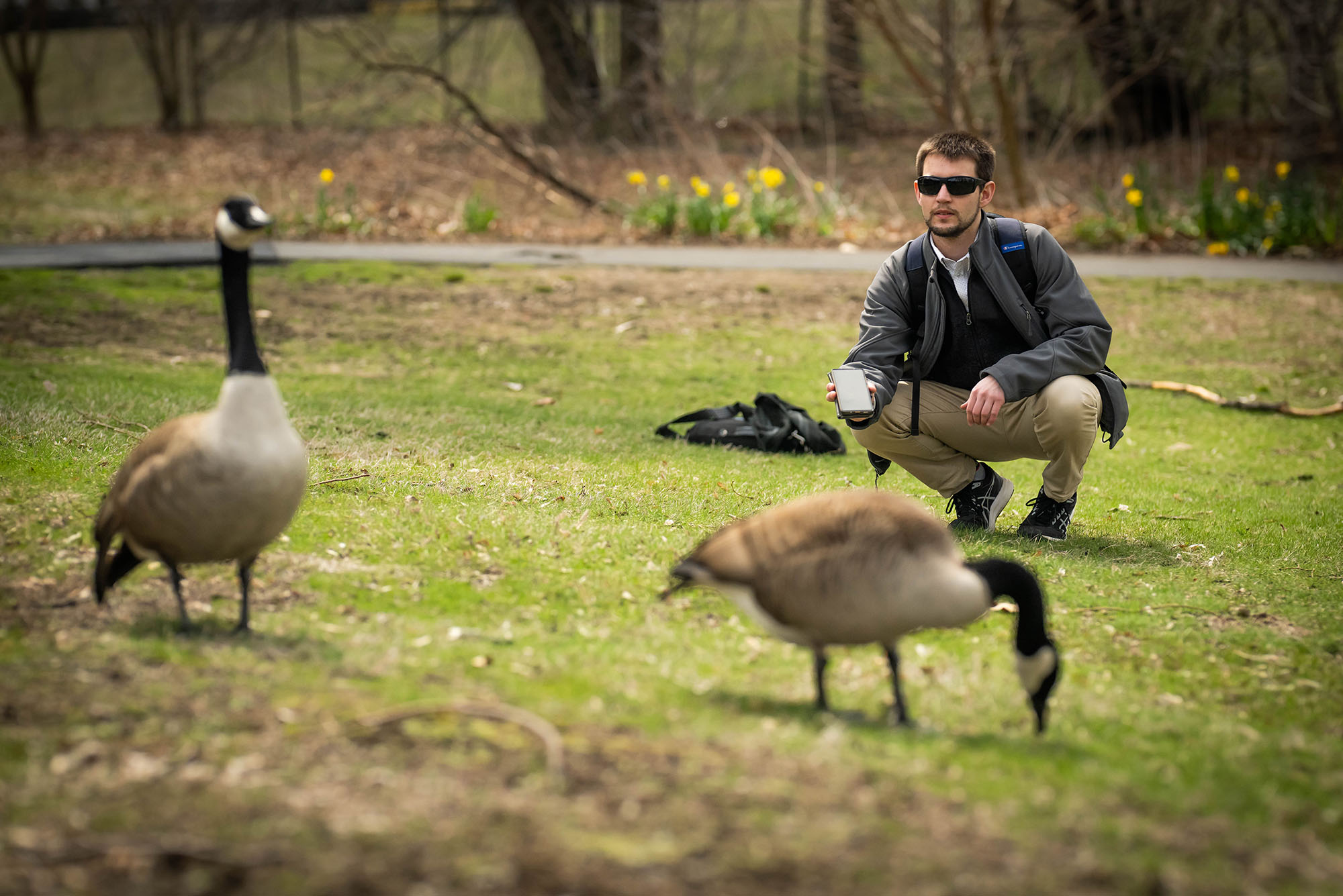
This Series
Also in
How I Made This
-
March 5, 2025
How I Made This: Maithili Rajput (CFA’25)
-
April 8, 2025
How I Made This: Ethan Vettese (CFA’26)
-
May 13, 2025
How I Made This: Raquel Philippe (CFA’26)

Comments & Discussion
Boston University moderates comments to facilitate an informed, substantive, civil conversation. Abusive, profane, self-promotional, misleading, incoherent or off-topic comments will be rejected. Moderators are staffed during regular business hours (EST) and can only accept comments written in English. Statistics or facts must include a citation or a link to the citation.